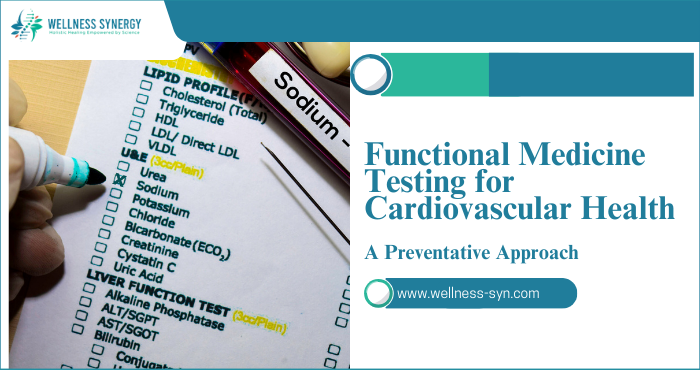Functional Medicine Testing for Cardiovascular Health
Cardiovascular diseases (CVDs) are the leading cause of death worldwide, causing millions of deaths every year. Traditionally, heart health focuses on treating problems after they happen. But what if we could prevent heart disease before it starts? This is where Functional Medicine Testing comes in. It’s a preventive approach that looks at the root causes of heart problems and offers personalized solutions for long-term health. We’ll explore how Functional Medicine Testing can improve heart health. We’ll also explain the science behind it and how it helps people understand their risks so they can take steps to keep their hearts healthy.
What Is Functional Medicine Testing?
Functional Medicine Testing is a set of advanced diagnostic tests that uncover the underlying causes of health issues. Instead of just treating symptoms, these tests help healthcare providers identify imbalances or body problems that may contribute to disease. The goal is to understand how different factors—like genetics, diet, lifestyle, and environment—affect health.
For cardiovascular health, Functional Medicine Testing might include tests for things like Chronic inflammation, blood sugar levels, nutrient deficiencies, hormone imbalances, or genetic risks. By understanding these factors, healthcare providers can create a more personalized treatment plan to prevent or manage heart disease and other health conditions.
Importance of Functional Medicine Testing
Functional Medicine Testing uses advanced lab tests and assessments to gather detailed information about a person’s health. These tests are more profound than traditional medical exams, providing insights into the body’s biochemical processes, cell function, and genetic predispositions. Regarding heart health, these tests can reveal important details that regular tests like cholesterol or blood pressure readings may miss.
Here are some key Functional Medicine Tests that can help assess cardiovascular risk:
- Advanced Lipid Panel
Unlike standard cholesterol tests, which only measure total cholesterol, LDL, and HDL, an advanced lipid panel examines the size and density of lipid particles. Smaller, denser LDL particles are more likely to cause plaque buildup in the arteries, increasing heart disease risk, while larger, fluffier LDL particles are less harmful. - Inflammatory Markers
Chronic inflammation is a leading cause of cardiovascular disease. Inflammation can damage arteries and lead to plaque buildup, raising the risk of heart attack or stroke. Tests like high-sensitivity C-reactive protein (hs-CRP) and homocysteine levels can measure inflammation, and elevated levels can indicate a higher risk of heart disease. - Genetic Testing
Genetic tests can reveal if you’re more likely to develop certain heart-related conditions. For example, the APOE gene test can help identify people at a higher risk for diseases like Alzheimer’s linked to heart health. Other genetic markers can show how your body processes cholesterol or fats, clarifying your heart health risks. - Blood Sugar and Insulin Sensitivity
High blood sugar and insulin resistance are major risk factors for heart disease. Functional Medicine practitioners often test fasting glucose and insulin levels to evaluate insulin sensitivity. Identifying issues with blood sugar early can help prevent or manage diabetes and its associated cardiovascular risks. - Hormonal Imbalances
Hormones like cortisol, thyroid hormones, and estrogen affect heart health. Imbalances in these hormones can lead to high blood pressure, high cholesterol, or poor circulation. Tests for thyroid function, adrenal health, and overall hormonal balance can uncover cardiovascular health issues.
How Functional Medicine Testing Can Prevent Heart Disease
Now that we’ve covered some key tests in Functional Medicine Testing let’s explore how these tests can help prevent heart disease.
- Identifying Early Risk Factors
One of the most significant advantages of Functional Medicine Testing is its ability to spot early signs of heart disease before symptoms show up. For example, high levels of inflammation or poor insulin sensitivity might not cause noticeable symptoms, but they can increase your risk of heart disease. By identifying these risks early, Functional Medicine practitioners can help you make lifestyle changes—like improving your diet, exercising more, or managing stress—before the problem worsens. - Personalized Treatment Plans
Traditional heart disease treatments often use a one-size-fits-all approach, like prescribing the same medications for high cholesterol or high blood pressure. However, this may not work for everyone. Functional Medicine Testing allows doctors to create personalized treatment plans that target your specific health risks. Whether improving gut health, reducing inflammation, or adjusting your diet, Functional Medicine provides a tailored approach to heart disease prevention. - Tracking Progress Over Time
Functional Medicine Testing assesses your cardiovascular risk at a single point in time and can also track how your health changes over time. Regular testing helps you see whether the steps you’ve taken—like dietary changes or supplements to reduce inflammation—are positively impacting your heart health. This allows you to adjust your approach and stay on track with your heart disease prevention plan.
A Holistic Approach to Heart Health
Incorporating Functional Medicine Testing into your healthcare routine goes beyond just taking a few tests—it marks a shift toward a more holistic, proactive approach to health. Functional medicine practitioners don’t only focus on the heart but also consider the entire body and how all its systems work together. This broader perspective helps uncover hidden imbalances or deficiencies contributing to heart problems.
Conclusion
Heart disease remains a leading cause of death worldwide, but Functional Medicine Testing provides a promising way to prevent it before it becomes a serious issue. By identifying risk factors early and creating a personalized, wellness holistic health approach to heart health, Functional Medicine empowers individuals to take control of their cardiovascular health and make informed decisions that can lead to a longer, healthier life.
If you’re concerned about your cardiovascular health or simply want to take a more proactive approach to prevention, consider exploring Functional Medicine Testing at Wellness Synergy. Through detailed, individualized assessments, you can gain deeper insights into your heart health and take the necessary steps to protect it for years.
Disclaimer:
Wellness Synergy, its products, and Dr. Ilka Tamar do not intend to cure, treat, heal, or prevent diseases or illnesses. These statements have not been evaluated by the Food and Drug Administration. The information on our social media and website is for informational purposes only and is not a substitute for medical advice or diagnosis from your physician or other healthcare professional. This information is meant for general wellness purposes and does not claim to diagnose, treat, or cure any illness or health condition. If you suspect you have a medical issue, please contact your physician or healthcare provider.


